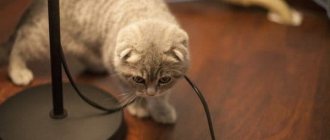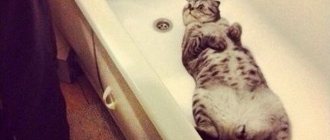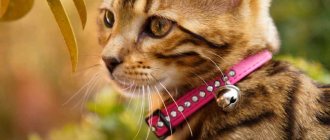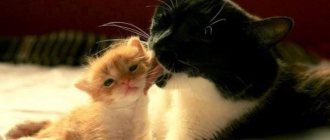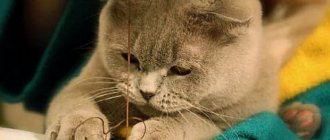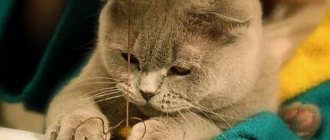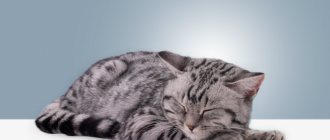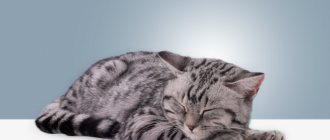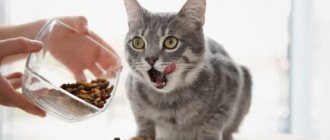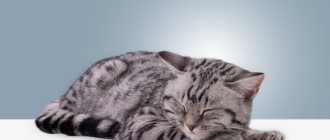At some point, you've probably caught your cat stomping—rhythmically pushing her paws in and out against a soft object, which could be a blanket or even your lap.
While not all cats trample, it is a common behavior for both young and adult felines. Some cats stomp their feet or back contentedly and purr when petted, but they may seem to do this for no clear reason.
Cats even have their own techniques - some never use their claws when stomping, and some use all four paws.
There are several different ideas as to why cats "massage."
Here are some of the most popular theories about why cats trample their owners and certain objects.
They're stressed
Some cats will chew or eat non-food items when stressed.
This can be a form of calming behavior. Some breeds, including Siamese cats, are more likely to chew things to reduce anxiety. If you've been working longer hours, rearranging furniture, or bringing home a new pet, these can all cause stress for your cat. Solution. Talk to your veterinarian about ways to minimize stress. Make sure your cat's environment is sufficiently enriched. Introduce new pets slowly and consider using a cat pheromone diffuser to help your cat feel more secure and balanced.
Diagnosis and treatment
The cat is suckling.
After detecting lost fur, it is necessary to urgently show the pet to a veterinarian, since at home there is no way to understand the cause of the disease. To make a diagnosis, the veterinarian will carry out the following procedures: collect anamnesis (interview the owner about past diseases, nutrition); conduct an external examination for the presence of characteristic symptoms; will take blood and skin scrapings for study. If necessary, ultrasound diagnostics are performed. After determining the cause of alopecia, the doctor prescribes treatment recommendations:
- Fleas. Elimination of parasites is carried out using shampoos (Fitoelita, Lugovoy, Celandine), drops on the withers (Stronghold, Advocate, Bars), sprays (Delix, Frontline). For prevention, it is recommended to wear a flea collar.
- Lichen. Treatment is usually local - shampoos (Doctor, Alezan, Antifungal), ointments (Yam, Sanderm), Fungin is effective. Vaccines are common for treatment and prevention - Polivac, Vakderm.
- Avitaminosis. If the animal is fed natural products, it is recommended to add a vitamin complex. It is better to give pregnant cats special food designed for this condition. Sometimes doctors prescribe sulfur preparations and immunostimulants.
- Hormonal imbalances, dermatitis, stress - specific treatment depending on the identified problem.
- Inflammation of the paraanal glands. Treatment – massaging the anus area from the outside or inside, treatment with an antiseptic through a catheter. If necessary, antibiotics and rectal suppositories are prescribed to relieve inflammation.
- Allergy. The irritant is eliminated and antihistamines are given.
If your cat's tail comes off, then the best method of preventing this symptom is prevention. It is enough to provide adequate feeding and care, regular examinations and monitoring of the pet’s condition.
Reasons for behavior
How to teach a dog to give paw?
Veterinarians and animal psychologists have identified a considerable list of reasons why a domestic cat or tom may begin to lick the hands and face of its owner. Moreover, much here depends both on the character and temperament of the animal, and on its age, as well as the conditions of detention and relationship with humans.
The reason may be one or many. Therefore, if the owner intends to wean his pet from such an unusual habit, he will first have to deal with the reason for its occurrence. Let's look at the most common factors that can lead to the formation of such behavior.
Why do kittens stick to objects?
If the cat is limping on his front leg
If your cat is sucking on your hand, ear, or other things, the following may be the cause:
- Early weaning from breastfeeding mother's milk or mother cat.
- Lack of love and care from the owner. Kittens feel a particular shortage during adaptation and socialization. At this time, the owner will need to create the most comfortable conditions for the growth and development of the pet, and protect it from stress.
- Boredom. If a kitten is bored, it may begin to exhibit a sucking reflex.
- Hereditary or breed predisposition. When the kitten's parents had the same habits, with a high degree of probability they can be passed on to the small cat. In addition, representatives of the Persian and Siamese breeds are most susceptible to the sucking reflex.
- Constant stress.
- Diseases of the endocrine system and dental problems. In this situation, the presence of pathologies can only be determined by a veterinarian. If the owner of a kitten suspects the development of illnesses, you need to take the kitty to a veterinary clinic.
Often this habit is formed in children who are artificial.
Being on artificial feeding and underfeeding also causes the sucking reflex to appear. In this case, cats often try to get food for themselves on their own. Often the pet cuddles in woolen clothes that remind him of his mother
It is important for the owner to force the cat to get rid of this habit as soon as possible, since hairballs get stuck in the stomach and cause problems with the digestive system. In addition, similar behavior can also be observed when there is a lack of vitamins in the body.
Why does a cat suck a blanket, blanket, tail or paw?
Owners don’t think about how to wean a cat from sucking a blanket if every morning the pet has a happy face:
- jumps on the bed;
- paws;
- purrs with pleasure.
This behavior is a sign of trust and love between the pet and its owner. Sucking on a blanket saturated with the scent of a person of the highest rank in the family is a recognition of strength and, at the same time, one’s own safety.
If the cat sucks on blankets and other bedding not in the morning, there are several reasons:
- Impaired metabolism.
- Stressful situation (sucking calms).
- The kitten is teething.
- The sucking reflex has not faded in a baby or an already mature cat.
Sucking a tail or paw should alert the owner : perhaps the cat is trying to pull out a splinter. If, when you carefully feel the paw, the cat withdraws the limb, you will need the help of a veterinarian. If no pain is observed, he may have been taken away from his mother early or he is experiencing severe stress.
What to do if a kitten is left without a mother?
As a rule, orphaned or bottle-fed kittens begin to be introduced to food a little earlier, at about three weeks of age, but otherwise the process proceeds unchanged. Start offering milk replacer not from a pacifier, but in a saucer, teaching the kitten to lap. Gradually move on to a gruel mixed from high-quality milk replacers and kitten food. As your kitten becomes accustomed to this food, gradually reduce the amount of milk replacer used. By five to six weeks of age, the kitten should be completely fed baby food.
Kittens can play with porridge, splash it on the floor and get their paws into the saucer before they realize that it is now their food. Be patient and do not interrupt the learning process - eventually the kittens will understand what you want from them. Prepare a soft, damp cloth to wipe away any remaining food from your kitten's head and paws after feeding. If the kitten has had a “bathe,” gently dry it with a towel and keep it in a warm, draft-free place until it is completely dry.
* ASPCA (The American Society for the Prevention of Cruelty to Animals)
15.01.2018
Is it possible to wean a kitten from the sucking reflex and is it necessary to do so? The sucking reflex is an unconditioned instinct that allows newborn mammals to survive. Blind, newly born kittens have only one goal - to find the mother's nipple and extract colostrum from it. What to do if the baby is too attached to his mother, when is the best time to introduce complementary foods and what methods of weaning from the cat can be used. Let's look at it in more detail below.
How to wean your pet from a bad habit?
If the owner is determined, then he should be patient and act with love and care:
- As soon as the cat “gets down to business,” you should distract him with an even more pleasant activity - caress, stroke, talk. This should calm your pet.
- A paw, blanket or other object “favored” by the cat can be replaced with a more suitable one, for example, a toy. Let the sleepy cat hug and suck on her, but not play. This item will serve as a “sleeping medicine”.
- If such measures do not bring results, you can lubricate your pet’s paw with a composition that has a bitter or specific taste. This could be mustard, camphor, aloe juice, wormwood tincture.
When fighting a cat's habit, the owner should not be rude or physically forceful. It is undesirable for a pet that did not receive maternal care in childhood to be further traumatized. In addition, it is worth knowing that if a cat is loved and cared for, then he himself can forget about his childhood addiction.
Why do cats trample their owners?
What if your cat loves to trample people, namely you? If your cat curls up and tramples on your lap while you pet him, he is loving you back and telling you that he loves you back.
Unfortunately, this can be quite painful, but the happier the cat, the more painful and deeper it will dig with its sharp claws. Never punish a cat for this behavior - she does not understand that this is painful for you.
Try placing a thick, soft partition between the cat and your knees. To ensure both you and your cat's comfort, make it a habit to trim your cat's nails with clippers or purchase nail guards to cover your cat's claws.
How to stop a cat from licking armpits
While there is nothing wrong with this, this behavior is undeniably creepy. Your cat will look poorly groomed if a guest or friend sees her licking your armpits.
And if you remove your cat from your armpits, but she still insists, there are several ways to stop insisting.
Any time you feel your cat approaching your armpits to lick them, or has already started licking your armpits, consider doing the following:
- Don't let your pet lick your armpits before he starts doing so. This way he will know that you don't like doing it and will get used to not doing it again and again.
- Start playing with your pet when you feel like he is about to lick your armpits.
- You can distract your pet with a toy to do something your pet likes. This will work when your pet is already licking your armpits. Distraction is the best way to keep your cat from doing this.
- Using a citrus-scented deodorant may cause your cat to stop licking your armpits because cats don't like the taste or smell of citrus.
How to stop a cat from sucking
A cat's rough tongue looks like a fine-toothed comb through a magnifying glass. While licking, wool hairs cling to it. To clean the tongue, you have to swallow the fur.
Bezoars (balls of fur or hair) form in the stomach, and the risk of ileus (intestinal blockage) increases. This is a common problem in young and old cats and long-haired breeds.
How to wean a kitten from sucking?
Like human babies, baby kittens, during the first time after separation from their mother, taste objects that interest them.
For the correct formation of behavioral stereotypes, it is important:
- kitten feeding regimen;
- food offered to kittens;
- maternal separation program;
- psychological atmosphere and stress experienced.
Owner actions. As active measures for weaning tailed babies from the mother's breast and fostering independence, felinology recommends:
Letting 3-week-old babies taste soaked dry food or beef scraper from their fingers, gradually teach them to eat from bowls, breaking the “fingers-food” association. In addition, babies receiving high-calorie complementary foods suckle their mother cat much less. Starting from 1.5 months, the kittens are isolated from the mother cat for 1-2 hours every day, closing them in the next room. For a variety of leisure activities, the “children’s room” includes a dining room, multi-level shelter houses and a playground
At the same time, to occupy the attention of children, they use various toys and treats. To re-educate particularly stubborn suckers, it is necessary to put a special blanket on the mother cat that covers the nipples. It is not recommended to use any ointments or products for treating the mammary glands and chemically repelling kittens due to the possibility of poisoning both the cat itself and the cubs when licking. Minimum age for separation from mother – 2 months
If the baby came to a new family earlier, then in order to alleviate stress and feelings of loneliness, the owner must surround him with increased attention and care. Monitoring your pet's behavior will help you correct negative habits in time. If you notice an increased urge to suck, it is recommended to hide soft toys and replace them with elastic silicone balls, teasers with feathers and interactive toys that develop the baby’s hunting instinct to attack and grab “prey.” After 2 months, kittens are completely transferred to solid food, replacing soaked dry food and pates with whole granules or pieces of frozen raw meat. This is how the young animals get used to working with their jaws, reproducing chewing movements instead of sucking ones. Cats are fed exclusively from bowls. If a persistent habit of clinging to things or gnawing on inedible objects is detected, the pet’s diet is analyzed - perhaps this is a signal of a lack of certain food ingredients. To eliminate this, it is recommended to use high-quality super-premium and premium dry kitten food. An obsessive sucking reflex, combined with other signs of illness in a growing kitten, is a reason for a visit to the veterinarian. Perhaps then hidden diseases and developmental pathologies will be discovered. If an over-aged suckler is healthy, then the owner can show severity, expressing his disapproval and scaring off the stubborn one during an unwanted action. A stream of water from a spray bottle, clapping your hands, or the sound of a falling book will shift your attention and distract you from the obsessive process. The situation when a kitten chews and gnaws on the owner’s things requires measures to change the senses of taste and smell. To do this, items are treated with essential oils of mint, citrus fruits or coniferous plants, sprayed with a solution of lemon juice, vinegar, garlic water, or use special anti-gnaw sprays purchased at a pet store.
To successfully combat the bad habits of pets, it is important to maintain personal calm and act purposefully, excluding rude methods and psychological negativity. Some cats suck a blanket, for some reason periodically chew their owner's sweater, and are not averse to tearing into pieces and eating a woolen blanket
Geophagy (eating inedible things) begins with sucking
Some cats suck a blanket, for some reason periodically chew their owner's sweater, and are not averse to tearing into pieces and eating a woolen blanket. Geophagy (eating inedible things) begins with sucking.
The owner explains this behavior by immaturity: sucking the tail, fur or paw - he misses his mother. This is mistake. Let's look at how to wean a kitten from the sucking reflex before the hobby develops into uncontrollable eating or slobbering on interior items.
How to wean a kitten from a cat?
The sucking reflex in a cat is formed in the neonatal period - in the first 7-10 days of life. Together with milk, he receives nutrition and immune protection. Soon they themselves begin to look for the nipple, focusing on the smell and warmth. Cats stop feeding their kittens around 8-12 weeks. They decide for themselves when to stop breastfeeding; there is no need to wean the cat off suckling before that. While they receive the necessary portion of nutrients to grow and get stronger.
Creating conditions as close to natural as possible
A cat's fur is a kind of pillow and a way to preserve and accumulate heat. Kittens in such conditions are protected from low temperatures and feel completely safe. If a cat is weaned from sucking, you need to set up a small area for the pets to grow up comfortably:
- immediately after birth, it is best to use products made from natural wool;
- as the eyes open after 5-10 days, they can be replaced with more rigid materials, for example, a loose layer of a piece of padding polyester.
If you have the desire and funds, there are many ready-made solutions available for sale. A variety of nesting houses in pet stores allow you to choose the best option, taking into account the number of kittens, room temperature and general interior. As pets get older, they will begin to see the house as their personal space and will gather together for naps.
How to wean a kitten from sucking?
Like human babies, baby kittens, during the first time after separation from their mother, taste objects that interest them.
For the correct formation of behavioral stereotypes, it is important:
- kitten feeding regimen;
- food offered to kittens;
- maternal separation program;
- psychological atmosphere and stress experienced.
Owner actions. As active measures for weaning tailed babies from the mother's breast and fostering independence, felinology recommends:
Letting 3-week-old babies taste soaked dry food or beef scraper from their fingers, gradually teach them to eat from bowls, breaking the “fingers-food” association. In addition, babies receiving high-calorie complementary foods suckle their mother cat much less. Starting from 1.5 months, the kittens are isolated from the mother cat for 1-2 hours every day, closing them in the next room. For a variety of leisure activities, the “children’s room” includes a dining room, multi-level shelter houses and a playground
At the same time, to occupy the attention of children, they use various toys and treats. To re-educate particularly stubborn suckers, it is necessary to put a special blanket on the mother cat that covers the nipples. It is not recommended to use any ointments or products for treating the mammary glands and chemically repelling kittens due to the possibility of poisoning both the cat itself and the cubs when licking. Minimum age for separation from mother – 2 months
If the baby came to a new family earlier, then in order to alleviate stress and feelings of loneliness, the owner must surround him with increased attention and care. Monitoring your pet's behavior will help you correct negative habits in time. If you notice an increased urge to suck, it is recommended to hide soft toys and replace them with elastic silicone balls, teasers with feathers and interactive toys that develop the baby’s hunting instinct to attack and grab “prey.” After 2 months, kittens are completely transferred to solid food, replacing soaked dry food and pates with whole granules or pieces of frozen raw meat. This is how the young animals get used to working with their jaws, reproducing chewing movements instead of sucking ones. Cats are fed exclusively from bowls. If a persistent habit of clinging to things or gnawing on inedible objects is detected, the pet’s diet is analyzed - perhaps this is a signal of a lack of certain food ingredients. To eliminate this, it is recommended to use high-quality super-premium and premium dry kitten food. An obsessive sucking reflex, combined with other signs of illness in a growing kitten, is a reason for a visit to the veterinarian. Perhaps then hidden diseases and developmental pathologies will be discovered. If an over-aged suckler is healthy, then the owner can show severity, expressing his disapproval and scaring off the stubborn one during an unwanted action. A stream of water from a spray bottle, clapping your hands, or the sound of a falling book will shift your attention and distract you from the obsessive process. The situation when a kitten chews and gnaws on the owner’s things requires measures to change the senses of taste and smell. To do this, items are treated with essential oils of mint, citrus fruits or coniferous plants, sprayed with a solution of lemon juice, vinegar, garlic water, or use special anti-gnaw sprays purchased at a pet store.
To successfully combat the bad habits of pets, it is important to maintain personal calm and act purposefully, excluding rude methods and psychological negativity. To wean a kitten from the sucking reflex, the owner needs to show maximum attention and care to the pet
Many cats, even as adults, love to suck on necks, clothes, fingers, earlobes and hair. The reason for this behavior is a number of different factors, including a lack of love and attention from the owner.
To wean a kitten from the sucking reflex, the owner needs to show maximum attention and care to the pet. Many cats, even as adults, love to suck on necks, clothes, fingers, earlobes and hair. The reason for this behavior is a number of different factors, including a lack of love and attention from the owner.
When can you remove kittens from your cat?
As a rule, the lactation period in cats ends when the kittens are 9-12 weeks old. During this period, babies can already eat on their own; it is permissible to gradually introduce new foods into their diet. Long-haired kittens and representatives of exotic rare breeds are taken away from their mother cat at an older age, since they develop more slowly than representatives of simple breeds.
Important! 2-2.5 months is the best time not only for weaning kittens from the mother cat, but also for accustoming small pets to solid food, new products after whole milk feeding.
If a cat has given birth to many kittens, the pet is in poor health, the caring mother gradually stops the lactation process when the kittens are 30-35 days old. Cats independently stop their kittens' attempts to suckle milk. They lay their nipples on the floor, carefully move the kittens to the side, or simply go to another place, leaving the babies for a while.
If babies are healthy, at about three weeks of age they begin to show interest in new foods and may even lap up milk from their mother's bowl. Already at this age, especially if there are many kittens in the litter, they can be supplemented with a mother's milk substitute, giving the babies 0.5-1 teaspoon. After a week, you can supplement the diet with baby food and special formulas for newborn babies.
Important! Boiled chicken, ready-made food, and other food products are introduced into the diet gradually, in small portions, so as not to provoke an upset stomach.
Young kittens up to two months old should be fed four times a day, regardless of how much mother's milk they receive. At six weeks of age, babies should receive three to four teaspoons of complementary foods per feeding. By 7-10 weeks of age, the serving size is gradually increased. At the same time, meat products should predominate in the diet.
Kittens can be given special canned liquid food, canned food (marked “for kittens”), boiled poultry, veal (in the form of minced meat). After two and a half months, gradually accustom small pets to more solid food and feed.
Recommendations
When weaning a kitten from a bad habit, you cannot use cruel methods: spraying water, loud screams, physical punishment. In these cases, the stubborn little one will suck things to spite the owner, and the mental disorder will worsen.
How to stop a cat from chewing wires
How to toilet train a kitten
How to stop a cat from yelling
Woolen items contain lanolin; kittens suck wool if they have an unbalanced diet. Children with unstable psyches suck things, yearning for their mother, experiencing a lack of attention from the owner.
Basic recommendations:
- Make a gradual transition to adult food. If the kitten is stubborn and does not want to lap from the saucer, offer a bottle with a pacifier and gradually wean it off the habit of sucking. Soak dry food, introduce soft food into the diet in the form of jellies and pates. Scrape the meat, start feeding it from your fingers, gradually preparing it for feeding from a bowl. Replace soft food with dry granules, and meat scrapers with pieces of frozen meat. Teach your animal to chewing movements instead of sucking.
- Review the diet: the kitten may be lacking nutrients. Feed your baby high-quality Premium and Super Premium food marked “for kittens.” Buy cat treats more often, teach your cat to enjoy solid food.
- During the period of food change, do not deprive the babies of their usual shelter. Buy a new nest for the mother.
- Take the animal in your arms more often, pet it, devote more time to your pet. Equip a play area equipped with climbing frames, hammocks, and interactive toys. New sensations will turn off the sucking reflex.
- Young cats that have a habit of sucking things should be neutered at an early age. During puberty, the response to stress intensifies.
- Never lubricate the mother's nipples with ointments with a strong odor, camphor oil. Licking a cat's fur containing chemicals can lead to poisoning; kittens run the risk of becoming intoxicated.
- If your cat's sucking reflex persists for a long time, consult your veterinarian.
It is important to understand the reason for the animal’s inappropriate behavior, create optimal living conditions, and protect it from stress and emotional upheaval. The owner needs to show maximum attention and care in order to wean the pet from a bad habit with the help of gentle measures, without damaging his psyche.
What is prohibited?
Some pet breeders recommend teaching kittens to fight the habit by spraying water on them. It is not recommended to use this method, as in this situation the pet may develop serious fears. In addition, a phobia of water often develops, which significantly complicates the existence of both the kitten and its owner. In this case, there can be no talk of any water procedures.
It is forbidden to scold a pet, much less beat it. The cat may misunderstand the owner and become afraid of him. The resulting stress will make the desire to suck objects even stronger. If you need to wean your baby off a female's breast, you may come across advice about spreading pepper or citrus juice on your cat's nipples. Doing this is strictly prohibited, since such manipulation can cause serious complications for both the kitten’s body and its mother. In such a situation, you will need to act in a different way and begin to temporarily separate the cats in different rooms. In this case, it is better to keep the baby busy with games. It is not recommended to leave your pet alone so that the sucking reflex does not switch to other objects.
Why does a cat suck its paws?
For some, this is just tough. It’s not very pleasant to watch a cat suck its paw; in addition, the wet fur that comes out clogs the kitten’s stomach, forcing it to get rid of the hairballs along with the food through the vomiting process. And if a family pet does this in bed under the owners’ blanket, many people have a desire to wean the pet from this activity as soon as possible.
Why do cats suck their paws? The answer to this question lies in the baby’s early childhood; most likely, he was taken away from the cat early. Before you start fighting an unpleasant habit, you need to understand that the kitten, having lost the protection of its mother, is trying to compensate for her love and paw sucking - just a manifestation of a reflex, a memory of the warm mother’s belly, in which it was so cozy and safe to lie. Just as human cubs begin to twirl a strand of their mother’s hair on their finger or twirl their mother’s warm ear, finding comfort and protection in this.
Now, if an adult cat sucks its paw, this should alert the owner. The reason may be an incorrectly selected diet for your pet.
shutterstock
What not to do during the weaning process
There are things you shouldn't do to avoid harming your cat:
- It is often advised to splash water on your pet in the process of weaning off the sucking reflex. This cannot be done, because in this case you create an association in the animal with unpleasant sensations, but also provoke the appearance of fears. The cat may get scared and become very stressed. In addition, against the background of what is happening, real psychological trauma may appear that will accompany the animal throughout its life. It is even possible to have a phobia of water.
- You cannot scold the cat or make physical comments . There is a possibility that the animal will misunderstand you and will simply be afraid. And against the backdrop of stress, the desire to suck on things or objects will only increase.
- If the kitten is weaned from its mother's breast, you should not smear pepper or anything else on the nipples . This can have a detrimental effect on the female. It is better to consider other options for weaning. For example, gradually separate animals in different rooms for a while. Moreover, it is better to play with the little fidget at this time. You shouldn't leave it alone. Nothing good will come of this.
How many nipples should cats have?
Most felines have 8 nipples (4 pairs). Moreover, they are located in pairs - opposite each other along the line of the sternum and the middle of the abdomen. Veterinarians distinguish three groups of nipples, depending on their location on the animal’s body:
- inguinal;
- abdominal;
- chest
Some wild relatives of cats have 4 nipples, a total of 2 abdominal pairs. These are, for example, tigers and lions. They rarely have more than 4 kittens in a litter, and if this happens, the 5th cub usually dies due to lack of nutrition.
It is worth noting that during lactation the mammary glands of the abdominal group secrete the largest amount of milk. They are also the most susceptible to various kinds of diseases.
In cats
Despite the fact that nipples in cats have no practical significance, their location and number in a male is exactly the same as in a female. But it is still worth noting that, being a rudiment, the nipples of cats are smaller and undeveloped, so it is very difficult to notice them, especially in long-haired representatives. In this regard, it may seem that cats have smaller nipples than cats, but this is not so.
Why do cats trample blankets and other soft objects?
Cats begin to trample like kittens, feeding from their mother. A nursing kitten instinctively massages its mother's nipples to stimulate milk production.
But why do they continue to knead even after infancy?
You may find your cat trampling on blankets, stuffed animals, or other soft objects around the house.
Although kneading a soft surface does not produce milk, adult cats forever associate kneading with the pleasant comfort of feeding.
We wean kittens from gnawing and sucking objects
If the kitten likes to cling to things, various objects, analyze what could provoke such behavior. Review your kitten's diet. Perhaps your pet is not getting the necessary nutrients from food. For feeding and artificial complementary feeding, use high-quality industrial “premium”, “super-premium” class food marked “for kittens”, and milk formula. Take into account age and individual characteristics of the body.
Do not hit or scold the kitten for its addiction under any circumstances. You can not only scare him, but also provoke severe stress.
It is possible that the pet will begin to do things out of spite and the addiction will worsen even more.
Talk calmly to your pet, switch his attention to something else, for example, interest him in toys
Analyze what objects attract your pet the most. As soon as the kitten starts gnawing and sucking on favorite objects, the effect of surprise can take effect.
- Spray the kitten with water from a spray bottle, clap your hands, hit a rolled-up newspaper on a hard surface. Animals should associate sucking with unpleasant sensations. In this case, the unpleasant effect should end immediately as soon as the sucking reflex stops.
- If your pet shows interest in clothes, some items can be treated with essential oils that smell like menthol, pine needles, or citrus fruits. Lubricate wires and other solid objects with hot pepper, onion, garlic water, and lemon juice. Hide clothes in closets and chests of drawers. You can put mint, lavender, and citrus zest on the shelves.
- Pay more attention to the kitten, interest your pet in active games, and set up a play complex. As already noted, a pet may experience a passion for objects due to lack of attention.
If an adult kitten does not want to wean itself off the sucking reflex, and you cannot determine the cause of this addiction, consult a veterinarian or zoopsychologist.
Is it possible to wean kittens from sucking a cat and is this measure reasonable? The sucking reflex is the key to survival. Essentially, newborn kittens don’t know how to do anything other than look for their mother’s nipple and eat. What to do if a kitten is very attached to mother's milk, at what age should complementary foods be introduced and what weaning methods can be used. We'll figure it all out below.
What causes the sucking reflex in kittens?
The mother’s ability to suckle is an unconditioned reflex that ensures the vital functions of the body. A newborn kitten, who can only squeak and suck, chooses its mother's nipple. She grabs it into her mouth, strokes it with her tongue, moves her paws over the mother’s belly, stimulating lactation, and defends the right to food, pushing away her sisters and brothers.
Although the eyes and ears are closed, the sense of smell and touch works:
- the nipple is located by smell;
- body position is adjusted using thermoregulation and tactile receptors.
Important. The first teeth appear from the 12th day; feeding with raw meat is allowed from 3-4 weeks of age. It is cut into thin strips, “worms”, which the kitten swallows with a sucking movement - it cannot chew yet.
A cat in the village or a wild one brings mice, independently accustoming the cubs to solid food. The transition to a normal diet for the species lasts up to 6 months.
People acquire month-old sucklers, sometimes a little older than a month. The transition to food that is convenient for the owner is abrupt; in this case, the sucking reflex does not subside, but this is the most favorable time to wean the kitten from sucking.
Video “How do cats show their love?”
In this video you will learn how a cat shows its love for its owner, how it tries to attract his attention in order to get the affection and care it needs.
Begging
If a domestic cat prefers to lick exclusively the hands of its owner, then this can be regarded as begging. This is how the animal begs for a treat. Most often, this behavior appears in kittens that were artificially fed. Usually babies lick the back of their hand. They may also chew it lightly during the process.
If the kitten also shifts its front paws while licking, then this is an instinctive behavior. Animals make such movements when they suck milk from their mother's nipples.
Showing love
Very often, a pet will begin to lick a person's hands and face to demonstrate its love. It is love that can explain similar behavior in dogs. These animals also show their humility and trust in this way.
Cats usually show their love by purring and rubbing against the owner's legs or arms. They also often perch on a person's chest. But in rare cases they can also “kiss.” This is how the animal simply shows its positive emotions.
Such love manifests itself episodically and does not have a permanent basis. Usually “kisses” are performed after feeding or when the pet is let into a warm house from a cold street.
False maternal instinct
Another explanation is the development of a false maternal instinct. As a child, the kitten saw manifestations of maternal love in the form of licking its back or tummy. In this way, the cat stimulates digestion in its offspring or lulls it to sleep.
False maternal instinct manifests itself if the pet has reached puberty, but is limited in sexual intercourse. Because of this, he looks for other ways to express his untapped emotions. Sterilization or castration will help correct the situation.
If you do not deal with this condition of the animal, then an excess of sex hormones in its body can provoke the development of a false pregnancy. Therefore, veterinarians advise spaying or neutering to protect the physical and mental health of your pet.
Sign of illness
Sometimes furry pets begin to lick the owner’s hands or head when they are feeling unwell. A cat cannot directly tell a person that something hurts. That's why they use intrusive affection.
If your pet begins to show strong love, it should be shown to a specialist just in case. Only a veterinarian, after a detailed examination of the animal, can accurately remove the disease from the list of causes of unusual behavior.
Strong odor from the owner
Cats have a very developed sense of smell. Therefore, they are able to sense smells better than humans. Due to this physiological feature, animals may begin to lick the neck or other parts of the owner’s body after he returns home from work. In this case, the pet will be attracted to the smell of sweat. The animal perceives sweat as a bait for other animals. By licking sweat, the pet tries to protect its owner from the harassment of strangers.

